* You are viewing Posts Tagged ‘Mathematics’
James Brown
March 27, 2012
Front Page, Project Updates, Publications, Videos
Tags: Editions, Europe, History of Science, John Wallis, Mathematics, Networks, Seventeenth Century
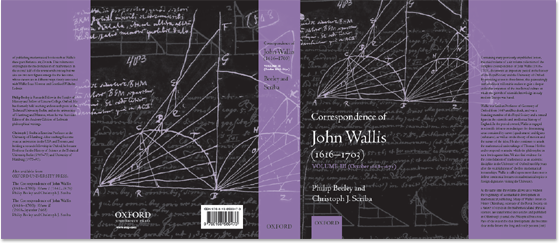
We are pleased to report that Volume III of The Correspondence of John Wallis (1616-1703) – one of a number of epistolary editions the Project is supporting, and the latest installment of the prestigious multi-volume edition of the mathematician’s letters – is now available for pre-order from Oxford University Press, pending publication in May. Painstakingly crafted by our Research Fellow Philip Beeley in conjunction with Christoph J. Scriba, work on the third volume began in the context of the AHRC-funded Wallis Project, and has been completed under the auspices of Cultures of Knowledge.
Consisting of 254 letters in total, the volume covers the exciting period 1668 to 1671, during which England was at peace with itself and its neighbours, publication techniques were becoming ever-more sophisticated (especially with the emergence of academic journals), and scientific activity thrived across the continent. It finds Wallis embroiled in fascinating debates on techniques for determining areas contained by curves (quadratures) and figures (cubatures), as well as on theories of motion and the nature of tides. Other volume highlights include Wallis’s celebrated disputes with Thomas Hobbes and French mathematician François Dulaurens, and ceremonial visits to Oxford by the Crown Prince of Tuscany and William of Orange, during which – in telling evidence of rapid disciplinary consolidation – Wallis presented the visiting dignitaries with examples of state-of-the-art geometrical thinking. Below, Philip discusses the latest installment and looks ahead to Volume IV, which will be delivered in the summer.
For further publication details and to pre-order your copy, please visit the OUP website. For background information about Wallis and other outputs emerging from this sub-project (including podcasts, video, and a complete catalogue of Wallis’s extensive correspondence within Early Modern Letters Online), head along to the Wallis webpage.
James Brown
July 04, 2011
Events, Lectures, Project Updates
Tags: Astronomy, Europe, History of Science, John Wallis, Mathematics, Networks, Oxford, Royal Society, Seventeenth Century
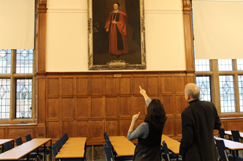
Kneller's 1699 portrait of Wallis in situ.
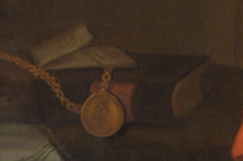
A telling epistolary detail.
In the eighth and final paper of our second seminar series on Thursday 23 June, our very own Dr Philip Beeley (University of Oxford) brought proceedings to a strong finish with a paper entitled ‘Oxford Science and the Republic of Letters: The Correspondence Networks of John Wallis’. Drawing on his intensive research on Wallis’s letters – two hard-copy editions of which he is preparing for publication with the support of the Project – Beeley argued that, in the absence of direct patronage, Wallis’s 246 individual correspondences enabled the mathematician, cryptographer, and (from 1649) Savilian Professor of Geometry to establish a name for himself within the broader European Republic of Letters. Indeed, the importance of epistolarity to Wallis is iconographically symbolised by the prominence of an opened letter in Kneller’s 1699 portrait of him (pictured), which now hangs in the University’s Examination Schools. Focussing on case studies, Philip used Wallis’s harmonious communications with the Danzig astronomer Johannes Hevelius to show how epistolary exchanges between distant friends could facilitate the kind of productive intellectual commerce and collaboration idealized by Comenius, Hartlib, and (in the context of the early Royal Society) Henry Oldenburg. However, switching his focus to Wallis’s more turbulent astronomical entanglements with the Dutch mathematicians Christiaan Huygens and Frans van Schooten, Beeley reminded us that the Republic of Letters was far from a gentleman’s club, and that interpersonal rivalries, methodological disuputes, accusations of plagiarism, and the quest for success and status remained powerful influences on scientific discussion throughout the second half of the seventeenth century. Questions focused on letters, mathematical pedagogy, and disciplinary formation; the importance of the patronage of Mary Vere during the first part of Wallis’s career; and unwritten codes of conduct and behaviour within the Republic of Letters. For past lectures in the series, please see the seminar webpage; details of the 2011 series will be available shortly.
 Podcast now available on the seminar page!
Podcast now available on the seminar page!
James Brown
May 16, 2011
Events, Lectures, Project Updates
Tags: Databases, Editions, Eighteenth Century, Gottfried Wilhelm Leibniz, History of Philosophy, Mathematics, Networks, Seventeenth Century
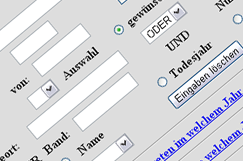
Visit Leibniz correspondence database.
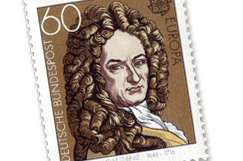
Leibniz depicted on a 1980 stamp.
In the second paper of our seminar series on Thursday 12 May, Dr Nora Gädeke (Gottfried Wilhelm Leibniz Bibliothek) provided us with a privileged insight into ‘Work in Progress: Leibniz’s Correspondence Network’, currently being reconstructed by the Akademie-Ausgabe edition, a group of collaborators in Potsdam, Münster, Hannover, and Berlin, under the aegis of the Academies of Science of Göttingen and Berlin-Brandenburg. In a detailed and reflexive analysis, Gädeke outlined the epistolary activities and contacts of this prolific correspondent, whose surviving letters number c.15,000-20,000, and who saw letter-writing as ‘one of the main characteristics of his life’. She also described the editorial principles and strategies of the definitive, multi-volume Akademie-Ausgabe edition, which include reproducing all items of Leibniz’s corpus chronologically and topically (including all extant copies), as well as the creation of a full critical apparatus. Further, she discussed the practical and conceptual challenges posed by such an ambitious, ‘cinematic’ enterprise. Gädeke concluded her talk, and introduced the question and answer session, by demonstrating the public database of Leibniz’s correspondence, one of a series of innovative online tools developed by the project to facilitate editorial work on the hard-copy volumes and disseminate some key findings beyond the edition itself. Discussion focused on a range of topics, including: the role of patronage in Leibniz’s network; information as a form of ‘social capital’ in early modern Europe; the importance of superimposing places in which letters were sent or received with geopolitical subtleties; Leibniz’s approach to storing and ordering his letters; his motivations for keeping them in the first place; and the key role online databases can play in supporting and publicizing conventional scholarly work on major corpora. Seminars take place in the Faculty of History on George Street on Thursdays at 3pm. For future talks in the series, please see the seminar webpage.
 Podcast now available on the seminar page!
Podcast now available on the seminar page!
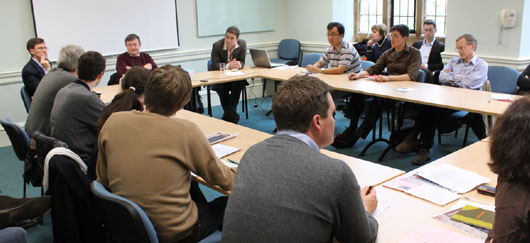
Dr Noël Golvers answers questions following his talk.
In the opening paper of the Project’s seminar series on Thursday 29 April, Dr Noël Golvers (Catholic University of Leuven) provided a large audience with a fascinating overview of the contours, chronology, and thematic preoccupations of ‘Scholarly Correspondence from the Jesuits in China with Europe (17th–18th Centuries)’. In a wide-ranging analysis, Golvers argued for the strategic importance of a large, well-regulated correspondence network to this administratively complex and geographically distributed community, a network which frequently and increasingly sustained communication on scientific matters alongside confessional and organizational subjects (previously used by Golvers to shed light on Jesuit contributions to astronomy and mathematics). He provided an overview of the characteristics of the correspondence generated by the China mission, information on transfer routes (both overseas and overland), and a synopsis of the broad range of learned topics they covered, especially from the 1680s (including mathematics, astronomy, engineering, and cartography). He also considered the impact of the letters on contemporary European readers, as well as their descent to and organisation within modern archives and collections. Overall, the paper provided fresh insights into both a particular epistolary culture of knowledge, and a neglected source for seventeenth-century European and world history more generally. Seminars take place in the Faculty of History on George Street on Thursdays at 3pm. For future seminars in the series, please see here.
 Podcast now available on the seminar page!
Podcast now available on the seminar page!
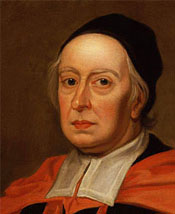
Detail from 'Portrait of John Wallis', by Godfrey Kneller. 1701. Oil on canvas, overall dimensions 23.8 by 144.8cm. (The Examination Schools, University of Oxford)
A roundtable symposium on ‘John Wallis as Correspondent and Controversialist’ will take place at Jesus College of the University of Oxford on 12–14 April 2010. Several leading authorities on the seventeenth-century mathematician will explore his multiple roles as correspondent, editor, cryptographer, and controversialist, as well as his relationship with his contemporaries, and the programme will also feature a guided tour of the University Archives (of which Wallis was keeper). Auditors are welcome. The symposium is the concluding event of the AHRC-funded Wallis Project (from late 2010, the editing of Wallis’s correspondence will form a sub-project of Cultures of Knowledge). A programme can be downloaded here (pdf). For further information, please contact Dr David Cram at david.cram@jesus.ox.ac.uk.









 Join
Join 